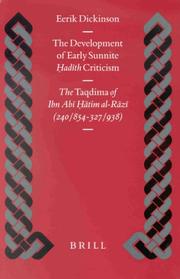| Listing 1 - 1 of 1 |
Sort by
|

ISBN: 9004118055 9004453245 9789004118058 9789004453241 Year: 2001 Volume: 38 Publisher: Leiden : E.J. Brill,
Abstract | Keywords | Export | Availability | Bookmark
 Loading...
Loading...Choose an application
- Reference Manager
- EndNote
- RefWorks (Direct export to RefWorks)
ḥadīth are the documents recording the words and actions of the Prophet Muḥammad. Originally an enormous and amorphous corpus, Muslim scholars of the third/ninth century separated the ḥadīth they regarded as true from those they held to be forgeries, producing collection of ḥadīth which still command the respect of Muslims today. Ibn Abī ḥātim al-Rāzī (240/854-327/938) was one of the most prominent exponents and practitioners of ḥadīth criticism. He left a copious written legacy, including his famous Taqdima , a biographical dictionary of the early ḥadīth critics. The Taqdima reveals Ibn Abī ḥātims's vision of the critic and gives insight into the mechanism of ḥadīth criticism. It also provides a platform for the examination of the basic intellectual orientation of the ḥadīth critics and their conflicts with their opponents.
Hadith --- Authorities --- Criticism, interpretation, etc. --- History --- Autorités --- Critique, interprétation, etc. --- Histoire --- Ibn Abi óHaatim, 'Abd al-Raóhmaan ibn Muóhammad, --- -Hadith --- -Tradition (Islam) --- Islamic law --- Islamic literature --- Sunna --- Criticism, interpretation, etc --- -History --- Ibn Abi Hatim, 'Abd al-Rahman ibn Muhammad --- Authorities. --- History. --- Ibn Abī Ḥātim, ʻAbd al-Raḥmān ibn Muḥammad, --- -Authorities --- Autorités --- Critique, interprétation, etc. --- Ibn Abī óHaatim, ʻAbd al-Raóhmaan ibn Muóhammad, --- Authorities of the Hadith --- Ḥāfiẓ (Hadith) --- Ḥuffāẓ (Hadith) --- Transmitters of Hadith --- Hermeneutics --- Transmitters --- Ibn Abī Ḥātim, ʻAbd al-Raḥmān ibn Muḥammad, --- Text criticism
| Listing 1 - 1 of 1 |
Sort by
|

 Search
Search Feedback
Feedback About UniCat
About UniCat  Help
Help News
News